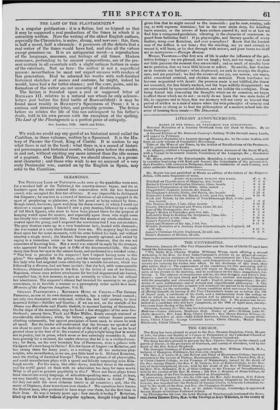THE LAST OF THE PLANTAGENETS * Is a singular publication
: it is a 'fiction, but so feigned as that it may be supposed a real production of the times in which it is ostensibly written. Now the writing of the oldest English authors, especially the Chronicles, is naïve, strong, and nervous : this, then, is half a novel, half a chronicle : it possesses all the defects that a real writer of the times would have had, and also all the virtues except genuinewss. It is an antiquarian novel—a reproduction of the language, manners, and feelings of old times. Modern romances, pretending to be ancient compositions, are of the pre- sent century in all essentials with a slight antique fashion in some of the externals. Not so here : the author is not a superficial person : nevertheless he must not expect success with readers of this generation. Had he adorned his works with well-finished historical sketches of scenes and costume, he might, indeed he would, have had a far better chance ; and the care, pains, and in- formation of the writer are not unworthy of illustration.
The fiction is founded upon a real or supposed letter of RICHARD III. relative to a natural son whom he only acknow- ledges just before the fatal battle of Bosworthfield : it may be found most readily in BURNETT'S Specimens of Prose : it is a curious and interesting letter, and probably genuine. The fiction before us relates the life of this son subsequent to his father's death, told in his own person with the exception of the spelling. The Last of the Plantagenets is a perfect piece of antiquity.
Svo. London, 1829. Smith and Elder..


















 Previous page
Previous page